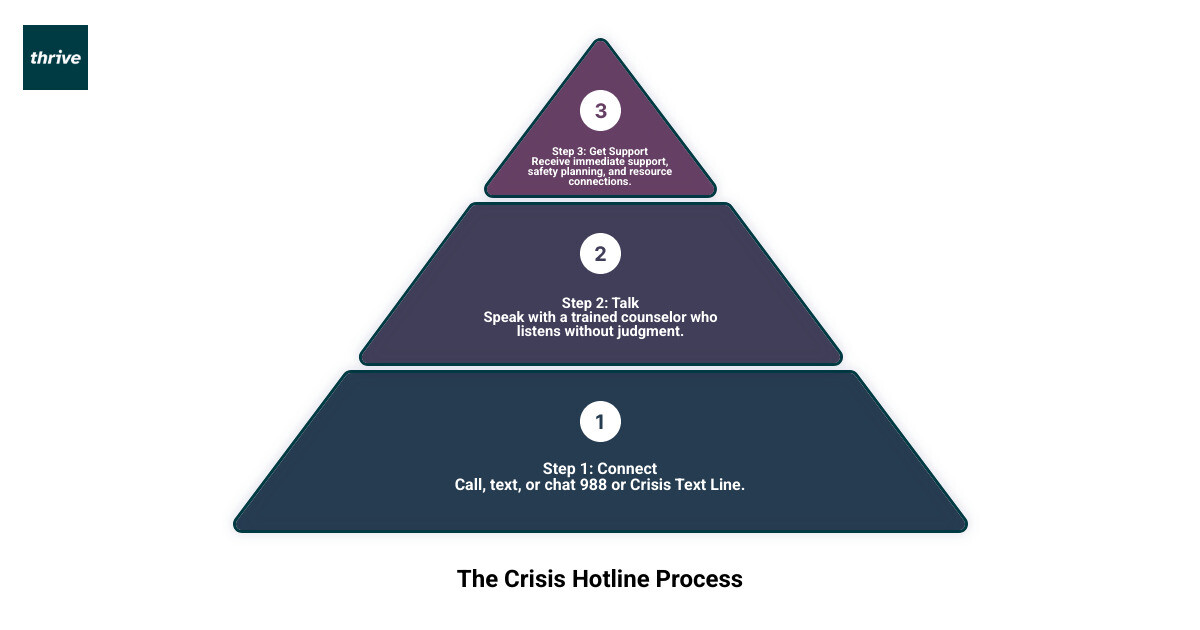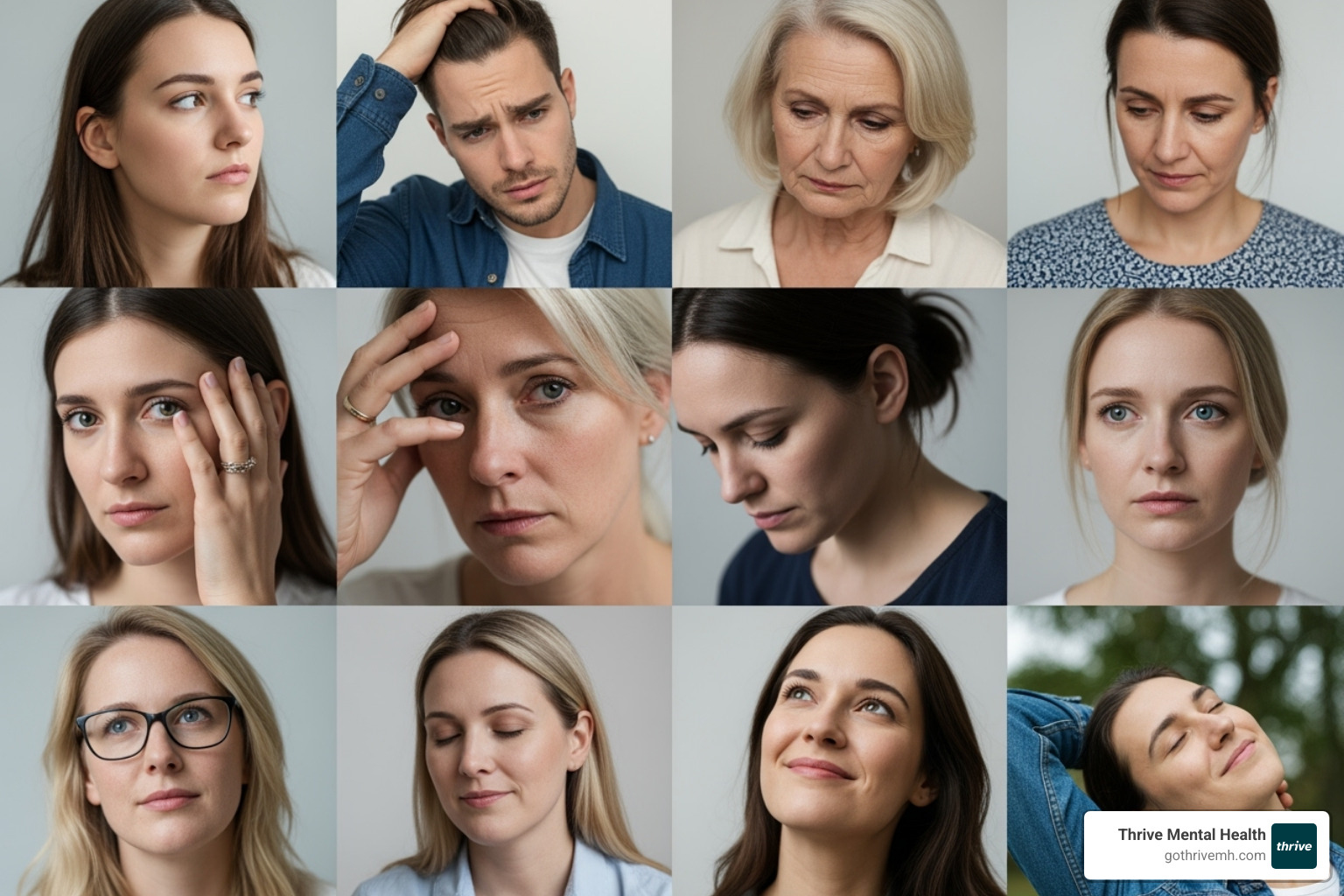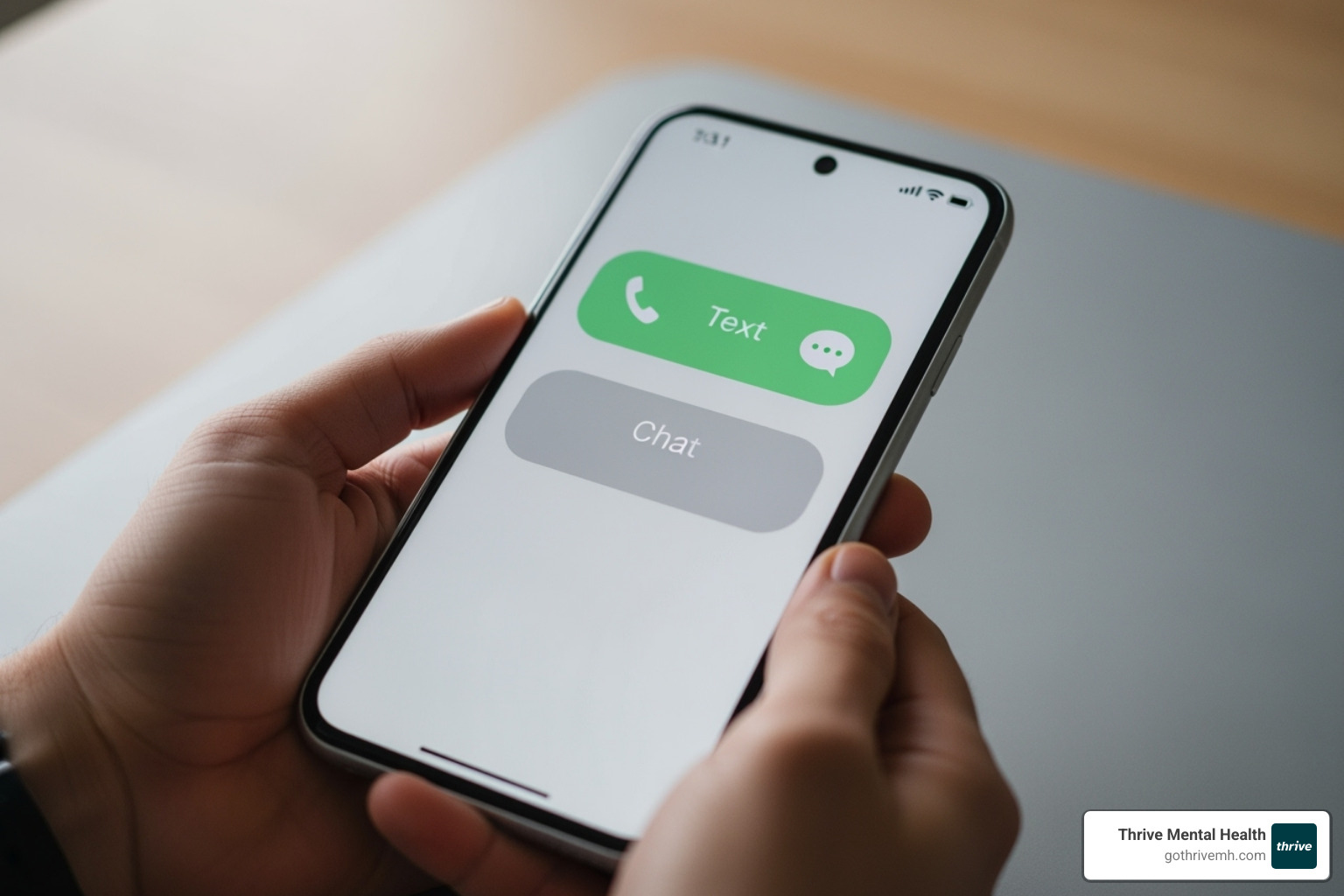Your Crisis Companion: A Guide to Crisis Hotline Support

Crisis Hotline: 988 for Crucial Support
Why Crisis Hotlines Are Essential for Mental Health Support
A crisis hotline provides immediate, free, and confidential support for anyone experiencing emotional distress or mental health emergencies. Whether you’re facing suicidal thoughts, anxiety, depression, or just need someone to talk to, trained counselors are available 24/7 to listen and help.
Quick Access to Crisis Support:
- Call 988 – National Suicide & Crisis Lifeline
- Text HOME to 741741 – Crisis Text Line
- Chat online at 988lifeline.org
- Available 24/7 – No appointment needed
- Completely free – No insurance required
- Confidential – Anonymous support
The need for these services is clear. In 2021, suicide was a leading cause of death for Americans aged 10-64, and millions struggled with substance use disorders. Yet, the impact of hotlines is profound: research shows that 98% of people who contact the 988 Lifeline get the support they need. Since 2005, hotlines have handled millions of contacts, representing real people finding hope in their darkest moments.
“You deserve to be heard. We’re here to listen.” This simple message captures what crisis hotlines offer: a judgment-free space where trained counselors help you move from crisis to calm, connecting you with resources and creating safety plans custom to your situation.
I’m Nate Raine, CEO of Thrive Mental Health, where I’ve spent over a decade working at the intersection of behavioral health innovation and crisis support systems. My experience developing partnerships across healthcare sectors has shown me how crisis hotline services serve as critical bridges between immediate support and long-term mental health care, a connection we are dedicated to strengthening for residents across Florida.

Essential crisis hotline terms:
What is a Crisis Hotline and How Does It Help?
Think of a crisis hotline as your mental health emergency room—but instead of treating broken bones, trained counselors help heal emotional wounds. The primary purpose is simple yet profound: to provide immediate emotional support when you need it most, help de-escalate overwhelming situations, and prevent suicide through compassionate intervention.
These services act as a bridge between crisis and calm. When your thoughts feel chaotic or dangerous, a crisis hotline offers a steady voice to help you find solid ground again. Beyond just listening, counselors connect you with ongoing resources and help create safety plans custom to your specific situation.
The beauty of calling a crisis hotline lies in three key benefits that remove common barriers to seeking help. Anonymity means you never have to share your name or personal details—you can simply be a voice seeking support without fear of judgment or consequences. Free access ensures that money never stands between you and getting help, regardless of your insurance situation or financial circumstances. 24/7 availability means support exists whenever crisis strikes, whether it’s during a sleepless night or a holiday when other services are closed.
The statistics are sobering. In 2021 alone, suicide was a leading cause of death for people aged 10-64, and millions of Americans battled substance use disorders. For every person who dies by suicide, many more are hospitalized for attempts, highlighting the urgent need for accessible intervention. These aren’t just numbers—they represent real people, including many of our neighbors here in Florida, struggling with challenges that can significantly disrupt daily life. Understanding the Impact of Mental Disorders on Daily Life helps us see why immediate, accessible support through a crisis hotline can be life-changing.

Common Reasons to Call
It’s important to remember: there’s no “right” reason to call a crisis hotline. If it’s a crisis to you, that’s reason enough. People commonly reach out for:
- Suicidal thoughts: This includes active plans to self-harm and passive thoughts that life isn’t worth living. Understanding Passive Suicidal Ideation.
- Substance use: Support is available for addiction, withdrawal, or other crises related to substance use.
- Depression and anxiety: When sadness feels crushing or anxiety becomes unmanageable, a counselor can help. Treatment for Major Depression and Anxiety often starts with a single call.
- Loneliness, grief, or trauma: Feeling disconnected, mourning a loss, or dealing with overwhelming memories are all valid reasons to seek support.
- Relationship issues: An unbiased listener can provide clarity during conflicts with partners, family, or friends.
- Feeling overwhelmed: Sometimes you don’t know what’s wrong, you just feel overwhelmed. That’s reason enough to call.
The Proven Impact of Reaching Out
Research confirms the power of reaching out. People consistently report feeling less distressed and overwhelmed after speaking with a trained counselor. A 2017 study found that nearly 80% of callers felt the conversation stopped them from attempting suicide, and over 90% said the intervention kept them safe.
This immediate support is a cornerstone of Evidence-Based Suicide Prevention, creating a bridge from despair to hope. Every call has the potential to save a life—yours or that of someone you love.
How to Connect and What to Expect
Taking that first step to connect with a crisis hotline can feel overwhelming, but it’s designed to be as straightforward as possible. The most important thing to know is that you have options, and you can choose whatever method feels safest and most comfortable for you in that moment.

How to contact a crisis hotline
Getting help has never been easier, thanks to multiple ways you can reach out. If you prefer talking on the phone, you can simply dial 988 for the Suicide & Crisis Lifeline. This three-digit number connects you to a network of local crisis centers across the country – no matter where you are.
Sometimes talking out loud isn’t possible or comfortable. Maybe you’re in a crowded place, or you just express yourself better in writing. That’s where texting comes in. You can text HOME to 741741 to reach the Crisis Text Line, or simply text 988 to connect with the Lifeline through text messages.
For those who prefer real-time typing, there’s an online chat option available directly through the 988 Lifeline website at Chat. And if you’re more comfortable using messaging apps, Crisis Text Line also offers support through WhatsApp.
What Happens When You Reach Out?
When you connect with a crisis hotline, you’ll be talking with someone who genuinely wants to help. These trained crisis counselors aren’t necessarily licensed therapists, but they’ve received extensive training in crisis intervention and know how to listen with empathy and without judgment.
The beautiful thing about these conversations is that there are no scripts. Your counselor won’t be reading from a manual or following a checklist. Instead, they’ll focus on understanding your unique situation and what you’re going through. They’ll listen to your story, help you sort through your feelings, and work with you to explore ways to cope.
If you’re having thoughts of suicide, your counselor might help you create a safety plan. This isn’t scary or overwhelming – it’s simply identifying your coping strategies, the people you can reach out to, and ways to make your environment safer. The entire process is collaborative, with the goal of helping you move from crisis to calm.
Your Privacy and Confidentiality
Your privacy is a top priority. Conversations with crisis hotlines are confidential, and you are not required to share any personal information like your name or address. This anonymity allows you to speak openly without fear of judgment.
All platforms are secure to protect your information. The only exception to confidentiality is in cases of immediate, unresolved threats to your life or someone else’s. In these rare situations, a counselor may contact emergency services as a last resort to ensure safety, a step emphasized by the 988 Lifeline. Knowing your conversation is protected can give you the confidence to reach out.
Understanding Key Numbers: 988 vs. 911
When you’re in crisis, knowing which number to call can feel overwhelming – but it doesn’t have to be. Think of 988 and 911 as two different doors to help, each designed for specific situations. Understanding when to use each one ensures you get exactly the right kind of support when you need it most.
The key difference is simple: 988 is for mental health and emotional crises, while 911 is for immediate physical emergencies. Both systems are increasingly working together to make sure you receive the most appropriate care, but they serve very different purposes.
Here’s how they compare:
| Feature | 988 Suicide & Crisis Lifeline | 911 Emergency Services |
|---|---|---|
| Primary Purpose | Mental health, emotional distress, substance use crises | Life-threatening medical emergencies, fire, crime |
| When to Call | Suicidal thoughts, severe anxiety, depression, loneliness, addiction crisis, needing someone to talk to | Immediate physical danger, active crime, fire, medical emergency |
| Who Responds | Trained crisis counselors | Police, firefighters, paramedics/EMTs |
| Type of Support | Empathetic listening, de-escalation, safety planning, resource referrals | Rapid response to physical threats, medical intervention, emergency transport |
When to Call 988
988 is your resource for emotional and mental health crises when there is no immediate physical danger. It was created as a compassionate alternative to traditional emergency services. Call 988 if you are experiencing suicidal thoughts, overwhelming anxiety, severe depression, a substance use crisis, or profound loneliness. Even if you just feel emotionally overwhelmed and need someone to talk to, 988 is the right number. Trained counselors are there to provide non-judgmental support and help you steer your feelings safely.
When to Call 911
911 is for emergencies that pose an immediate physical threat and require on-site responders like police, firefighters, or paramedics. Call 911 for life-threatening medical situations (like a heart attack or severe accident), fires, or crimes in progress. If a conversation with a 988 counselor reveals an imminent physical risk, they may guide you to call 911. The two systems work together to ensure comprehensive care. If you’re ever unsure, starting with 988 for emotional distress is a safe choice; they can help you get the right support.
Finding the Right Support: Specialized and Local Hotlines
While the national 988 crisis hotline provides excellent general support, sometimes you need someone who truly understands your specific situation. The good news is that our mental health support system recognizes this need, offering specialized services for different communities and unique challenges.
Think of it this way: while a general crisis hotline is like having a caring friend who’s a great listener, specialized hotlines are like talking to someone who’s walked in your exact shoes. They understand the nuances of your experience in ways that can make all the difference when you’re struggling.

Specialized National Hotlines
Several national hotlines focus on specific communities or types of crises, bringing deeper understanding to your particular situation:
Veterans and service members have their own dedicated support through the Veterans Crisis Line. If you’ve served our country, you can reach specially trained counselors who understand military culture by dialing 988 and pressing 1. You can also text 838255 or chat online for 24/7 confidential support. Learn more about the VCL.
LGBTQ+ young people can find understanding through The Trevor Project, which offers crisis intervention and suicide prevention services specifically for lesbian, gay, bisexual, transgender, queer, and questioning youth. Trans Lifeline provides another layer of support – it’s a peer support hotline run by and for trans people, offering both emotional and financial support during crises.
If you’re experiencing domestic violence, The National Domestic Violence Hotline provides essential tools and support to help survivors live their lives free of abuse. For those dealing with disaster-related stress, the Disaster Distress Helpline offers immediate crisis counseling for emotional distress related to natural or human-caused disasters.
Finding a local crisis hotline
Sometimes the best support comes from people who know your community. Local crisis hotlines often have unique insights into nearby resources and can connect you with services right in your neighborhood.
211 is a great starting point. Dialing this number connects you with local information about housing, food assistance, and mental health services in your specific area.
For a broader search, online directories like Find a Helpline provide comprehensive, verified listings of helplines worldwide. Your state and county health department websites are also excellent sources for local mental health and crisis resources, with regularly updated contact information.
Crisis Resources in Florida
Here in Florida, a strong network of mental health support understands our unique communities. Whether you’re dealing with hurricane stress or just need someone who gets Florida life, these resources are here for you.
The Florida Department of Health maintains comprehensive mental health links and resources for residents. In many areas, including Tampa Bay, local crisis centers serve as vital hubs, providing 24/7 support from people who understand the community.
NAMI Florida brings the National Alliance on Mental Illness expertise to our state, with local chapters offering support groups, education, and advocacy. They understand the challenges Floridians face when dealing with mental illness.
Florida’s 211 chapters, such as the Heart of Florida United Way 211, can connect you to mental health and crisis resources specific to your county or city. These local experts can help you steer the state’s mental health system.
At Thrive Mental Health, we’re proud to be part of Florida’s mental health support network. While crisis hotlines provide crucial immediate support, we’re here when you’re ready for the next step. We offer flexible outpatient programs that fit into your Florida lifestyle, providing a structured path toward recovery.
Beyond the Call: The Broader Crisis Support System
When you reach out to a crisis hotline, you’re not just getting help in that moment—you’re connecting to a much larger network of mental health support. These hotlines serve as a bridge, linking you from immediate crisis to ongoing care and recovery. Think of them as the front door to a house filled with resources, support systems, and pathways to lasting wellness.
The beauty of crisis hotlines lies in how they work within this broader system. They don’t just provide a listening ear and then send you on your way. Instead, trained counselors help connect you to therapists, support groups, community resources, and specialized programs that can provide the ongoing support you need. This connection is crucial because healing rarely happens overnight, and having a clear path forward can make all the difference.
The Importance of Follow-Up Care
The period immediately following a crisis is often one of the most vulnerable. Research shows that suicide risk can be high after a crisis event or hospital discharge, which is why follow-up care is so critical.
Effective follow-up has been proven to reduce these risks. When crisis centers check in, review safety plans, and connect you to ongoing services, they create a vital safety net. The 988 Lifeline now requires its centers to offer follow-up services for those who express thoughts of harm, with your consent. These caring check-ins reinforce coping strategies and help you find the right long-term resources. You can review the system’s commitment in the official best practices for follow-up care.
For many in Florida, this follow-up care is the bridge to lasting wellness. At Thrive Mental Health, we specialize in providing this next step through intensive outpatient programs (IOP) that offer structured support while allowing you to maintain your daily life—a crucial step when you need more than occasional therapy.
How You Can Support Crisis Hotlines
Crisis hotlines depend on community support to keep their phones answered and their chat services running. If you’ve ever benefited from these services—or just believe in their importance—there are meaningful ways you can give back.
Volunteering is one of the most direct ways to make an impact. Organizations like Crisis Text Line train volunteers to become crisis counselors, providing comprehensive preparation for this important role. It’s demanding work, but volunteers often describe it as profoundly rewarding. If you’re interested in exploring this opportunity, you can learn more here: Volunteer with Crisis Text Line.
Financial donations keep the lights on and the phones ringing. These 24/7 services require significant resources for training, technology, and staffing. Even small contributions help ensure that when someone needs help at 3 AM on a Tuesday, someone will be there to answer.
Spreading awareness might be the easiest but most important way to help. Simply sharing the numbers—988 or text HOME to 741741—with friends, family, or on social media can literally save lives. You never know who might need that information someday. When we normalize talking about mental health support, we make it easier for people to reach out when they need help.
The reality is that many crisis hotlines face ongoing funding challenges and volunteer shortages, even as demand for their services continues to grow. Your support, whether through time, money, or simply spreading the word, helps ensure these vital lifelines remain available for anyone who needs them.
Frequently Asked Questions about Crisis Hotlines
When you’re considering reaching out to a crisis hotline, it’s natural to have questions. We hear these concerns regularly, and understanding the answers can help you feel more confident about taking that important step toward getting support.
Are crisis hotlines really free and confidential?
Yes, national hotlines like 988 and the Crisis Text Line are always free. You will never be asked for payment or insurance information.
Your conversations are also confidential and anonymous. You can share as much or as little as you feel comfortable with, including your name. The only exception to confidentiality is if a counselor believes there is an imminent, unresolved threat to someone’s life. In these rare cases, they may contact emergency services as a last resort to ensure safety.
Do I have to be suicidal to call a crisis hotline?
Absolutely not. While suicide prevention is a core function, crisis hotlines are for anyone experiencing any kind of emotional distress. Whether you’re feeling sad, anxious, overwhelmed, lonely, or dealing with relationship problems, grief, or stress, a trained counselor is ready to listen. You don’t have to be at a breaking point to reach out for support.
What if I’m worried about someone else?
You can definitely call a crisis hotline for guidance about someone you care about. This is actually a really common situation, and counselors are well-equipped to help you steer it.
They can provide advice on how to approach a loved one who might be struggling, offer suggestions for starting difficult conversations, and share resources that could help both of you. Sometimes just talking through your concerns with a trained professional can give you clarity on the best way to support someone while also taking care of yourself.
Supporting someone else’s mental health can be emotionally draining and challenging. The counselors understand this and can provide support for you too as you work through how to help your loved one. You don’t have to figure it all out alone.
Conclusion: Your First Step Towards Lasting Support
Throughout this guide, we’ve explored how crisis hotlines serve as a vital lifeline for anyone experiencing emotional distress or mental health challenges. These services represent far more than just phone numbers—they’re your gateway to immediate, free, and confidential support whenever you need it most.
The key takeaways are clear: Crisis hotlines provide an accessible first step for anyone in distress, whether you’re facing suicidal thoughts, overwhelming anxiety, substance use challenges, or simply need someone to listen. You are never alone, and help is always available at the other end of a call, text, or chat. Reaching out isn’t a sign of weakness—it’s actually a powerful demonstration of strength and self-awareness.
When you dial 988, text HOME to 741741, or connect through online chat, you’re taking that crucial first step toward feeling better. The trained counselors who answer are there to listen without judgment, help you work through your feelings, and connect you with resources that can provide ongoing support.
For those in Florida who find that they need more structured care beyond the immediate support of a crisis hotline, professional treatment programs can offer the next level of comprehensive support. At Thrive Mental Health, we understand that sometimes one conversation isn’t enough—you might need ongoing, evidence-based care to build lasting wellness and resilience.
Our flexible intensive outpatient and partial hospitalization programs are designed specifically for adults and young professionals who want to maintain their daily responsibilities while getting the mental health support they need. Whether you’re in Tampa Bay, St. Petersburg, or anywhere else in Florida, our virtual and in-person options make it possible to access expert-led care that fits seamlessly into your life.
We believe that every step toward mental wellness deserves to be celebrated. Let a crisis hotline be your immediate companion during difficult moments, and let us be your partner in building a healthier, more resilient future.
Explore our vital mental health services.
